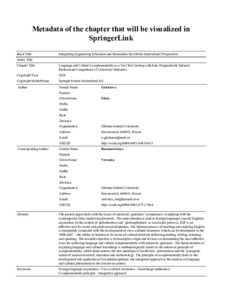Показать сокращенную информацию
Language and Culture Complementarity as a Tool for Creating a Holistic Pragmatically Induced Professional Competence of University Graduates
| Автор | Elena Grishaeva And, Veronica Razumovskaya | |
| Дата внесения | 2021-08-13T09:33:02Z | |
| Дата, когда ресурс стал доступен | 2021-08-13T09:33:02Z | |
| Дата публикации | 2020-05 | |
| Библиографическое описание | Elena Grishaeva And, Veronica Razumovskaya. Language and Culture Complementarity as a Tool for Creating a Holistic Pragmatically Induced Professional Competence of University Graduates [Текст] / Veronica Razumovskaya Elena Grishaeva And // Lecture Notes in Networks and Systems: Proceedings of the Conference "Integrating Engineering Education and Humanities for Global Itercultural Perspectives 25-27 March. — 2020. — Т. 131. — С. 933-941 | |
| URI (для ссылок/цитирований) | https://doi.org/10.1007/978-3-030-47415-7_100 | |
| URI (для ссылок/цитирований) | https://elib.sfu-kras.ru/handle/2311/142808 | |
| Аннотация | Abstract. The present paper deals with the issues of university graduates’ competences complying with the contemporary labor market requirements. The main attention is paid to foreign languages (mostly English) acquisition. In the context of globalization (and ‘globanglization’ as associated process), ESP is an effective tool for social and professional adaptation. The bilateral process of teaching and studying English is inseparably connected with the development of cross-cultural awareness which can be determined as the ‘fifth skill’ – the ability of learners to be aware of cultural relativity following reading, writing, listening, and speaking. The research objective is of descriptive origin and focuses on determining the most effective ways for achieving language and culture complementarity with university graduates. The harmonization of acquiring language and cultural knowledge is methodologically based on the universal principle of complementarity, which demonstrates the new paradigm of worldview, universalism and the synergistic nature of modern research, education and methodology. The principle of complementarity leads to the development and application of an interdisciplinary and integrated approach to the analysis of language and cultural phenomena in the classroom context. | |
| Тема | Foreign language acquisition | |
| Тема | Cross-cultural awareness | |
| Тема | Knowledge unification | |
| Тема | Complementarity principle | |
| Тема | Integrative approach | |
| Название | Language and Culture Complementarity as a Tool for Creating a Holistic Pragmatically Induced Professional Competence of University Graduates | |
| Тип | Journal Article | |
| Тип | Journal Article Preprint | |
| Страницы | 933-941 | |
| Дата обновления | 2021-08-13T09:33:02Z | |
| DOI | 10.1007/978-3-030-47415-7_100 | |
| Институт | Институт экономики, управления и природопользования | |
| Подразделение | Кафедра делового иностранного языка | |
| Журнал | Lecture Notes in Networks and Systems | |
| Квартиль журнала в Scopus | Q4 |

